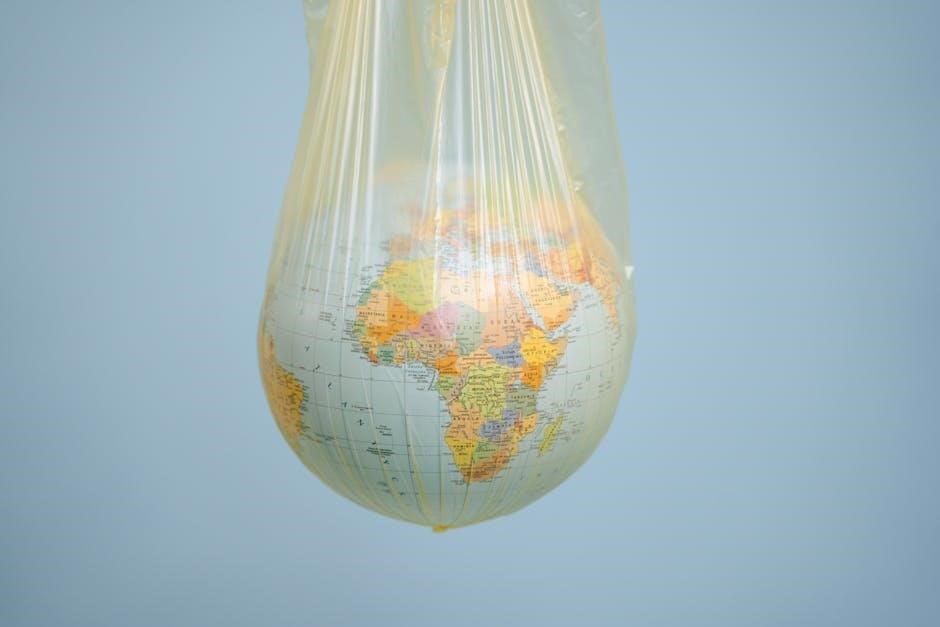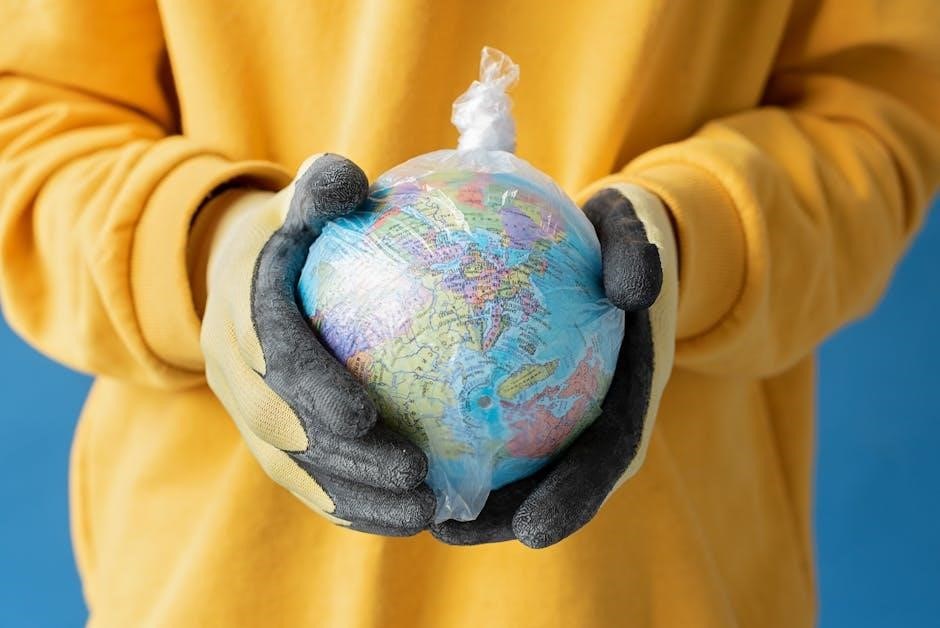sugar changed the world pdf
Sugar has profoundly shaped global history, economies, and cultures, driving trade, colonization, and societal change. Its sweetness fueled industries but also sparked health crises and ethical dilemmas, leaving a lasting legacy.
Overview of Sugar’s Historical Significance
Sugar’s historical significance spans thousands of years, shaping global trade, cultures, and economies. Originating in New Guinea, sugar cane spread to India, where it was first refined 2,500 years ago. From there, it reached the Middle East and Europe, becoming a prized commodity. Sugar fueled colonization, slavery, and industrialization, driving the transatlantic slave trade and influencing European imperialism. It transformed diets, sparking health crises like obesity and diabetes. Sugar’s impact extends beyond taste, reshaping societies, fueling conflicts, and leaving a complex legacy in modern times. Its influence on history is unparalleled, making it a defining force in shaping the world as we know it today.
The Role of Sugar in Shaping Global Economies and Societies
Sugar has played a pivotal role in shaping global economies and societies, becoming one of the most valuable commodities in history. Its production fueled the transatlantic slave trade, with millions of Africans forcibly brought to the Caribbean and Brazil to cultivate sugar cane. European economies flourished as sugar became a lucrative export, driving imperialism and colonization. The wealth generated from sugar funded technological advancements and industrial growth, while also creating stark social inequalities. Sugar’s economic dominance transformed labor systems, diets, and cultural practices worldwide, leaving a lasting impact on global trade and societal structures. Its influence remains evident in modern economic systems and cultural traditions.

The Origin and Early History of Sugar
Sugar originated in New Guinea around 8000 BCE, spreading to India and later the Middle East and Europe, becoming a valued luxury and refining techniques emerging.
Sugar Cane and Its Origins in New Guinea
Sugar cane, a thick-stemmed grass native to New Guinea, was first domesticated around 8000 BCE. Indigenous peoples chewed its reeds to extract sweetness, using it for both nutrition and rituals. Early cultivation spread to nearby islands, with evidence of sugar cane use found in ancient Southeast Asian and Pacific cultures. Its adaptability to tropical climates made it a valuable crop, eventually reaching India, where it became a cornerstone of trade and refinement. This humble plant laid the foundation for sugar’s global dominance, shaping economies and societies across centuries.
The First Refinement of Sugar in Ancient India
Around 2,500 years ago, ancient India pioneered the refinement of sugar, marking a significant milestone in its history. The process involved boiling sugarcane juice to create crystallized sugar, known as khanda. This innovation not only revolutionized sugar production but also established India as a hub for sugar trade. The technique spread to China and the Middle East, becoming a cornerstone of global commerce. Sugar refinement in India laid the groundwork for its widespread use in cuisine, medicine, and religious rituals, solidifying its role as a valuable commodity. This ancient practice set the stage for sugar’s enduring impact on economies and cultures worldwide.
Sugar’s Spread to the Middle East and Europe
Sugar’s journey from India to the Middle East and Europe marked a pivotal moment in its global dispersion. Arab traders introduced sugar to the Middle East, where it became a prized commodity. The Crusaders later brought sugar back to Europe, where it was initially a luxury item for the elite. By the 15th century, European colonizers established sugar plantations in the Mediterranean and Atlantic Islands, further expanding its reach. Sugar’s spread influenced cuisine, medicine, and trade systems, solidifying its role as a valuable commodity. This dissemination laid the foundation for sugar’s profound impact on European economies and cultures, shaping the course of history.

The Global Spread of Sugar Production and Trade
Sugar’s global spread transformed economies and cultures, shaping trade routes and colonial empires. Its production and trade reshaped societies, linking distant regions through its sweet influence.
Sugar in the Atlantic Islands and the Caribbean
Sugar production in the Atlantic Islands and the Caribbean became a cornerstone of global trade, reshaping economies and societies. The Atlantic Islands, such as Madeira and the Canary Islands, served as early testing grounds for large-scale sugar cultivation. Columbus introduced sugarcane to the Caribbean, sparking a sugar boom that transformed the region. Plantations dominated the landscape, driving deforestation and soil depletion. The Caribbean became a hub for sugar production, with islands like Barbados and Jamaica emerging as key producers. This sugar boom fueled economic growth but also led to the exploitation of enslaved labor, reshaping demographics and cultures. The sugar industry’s rise in this region laid the foundation for global trade patterns and colonial power dynamics, leaving a lasting legacy of both prosperity and inequality.
The Role of Sugar in the Transatlantic Slave Trade
Sugar production became a driving force behind the transatlantic slave trade, as the labor-intensive nature of sugar plantations created a massive demand for enslaved labor. European colonizers relied heavily on enslaved Africans to work on sugar plantations in the Caribbean and Brazil, leading to the forced migration of millions. The profitability of sugar fueled the expansion of the slave trade, shaping global economies and perpetuating racial inequalities. The brutal conditions on plantations caused immense suffering, yet sugar’s economic dominance persisted. This dark chapter in history underscores how sugar’s sweetness was built on the exploitation and resilience of enslaved peoples, leaving a profound and lasting impact on global societies.
Sugar Production in Brazil and Its Economic Impact
Brazil emerged as a global leader in sugar production, with its vast plantations driving economic growth. The country’s strategic use of sugarcane for both sugar and bioethanol production diversified its economy. Sugar exports became a cornerstone of Brazil’s foreign exchange, fostering industrial development and employment. The sugar industry’s expansion transformed rural areas, creating jobs and stimulating local economies. However, this growth also raised environmental concerns, such as deforestation and water usage. Brazil’s sugar production not only shaped its domestic economy but also influenced global markets, establishing it as a key player in the international sugar trade; This dual focus on sugar and biofuels positions Brazil as a resilient leader in the industry, balancing economic benefits with sustainability challenges.

Sugar’s Economic and Social Impact
Sugar reshaped global trade, fueled colonial empires, and transformed societies, creating wealth and inequality. Its influence spanned economies, cultures, and labor systems, leaving a profound and lasting legacy worldwide.
Sugar as a Commodity and Its Influence on Global Trade
Sugar emerged as a highly sought-after commodity, driving global trade networks and economic systems. Its production and exchange fueled the growth of European empires, shaping colonial relationships and labor systems. The demand for sugar influenced the transatlantic slave trade, as millions of Africans were forcibly brought to work on plantations in the Americas. Sugar’s value as a luxury item initially made it accessible only to the wealthy, but its mass production later democratized its consumption. This commodity not only reshaped economies but also interconnected distant regions, creating a complex web of dependencies and inequalities that persists in modern global trade dynamics.

The Connection Between Sugar and European Imperialism
Sugar played a pivotal role in European imperialism, fueling colonial expansion and shaping global power dynamics. European powers sought to control sugar production, driving the conquest of territories like the Caribbean and Atlantic Islands. Sugar plantations became central to colonial economies, relying on enslaved labor from Africa. This “White Gold” financed imperial ambitions, fostering wealth and influence for European nations. The pursuit of sugar fueled exploitation, displacement, and the transatlantic slave trade, leaving a legacy of inequality and social upheaval. Sugar’s allure shaped empires’ strategies, tying economic dominance to the exploitation of resources and labor, and forever altering the world’s political and social landscape.
Sugar’s Role in the Industrial Revolution and Technological Advancements

Sugar was a catalyst for technological growth during the Industrial Revolution, driving innovations in production and refining processes. The development of factories and machinery, such as roller mills and centrifugal systems, revolutionized sugar manufacturing, making it more efficient and scalable. These advancements not only transformed the sugar industry but also influenced other sectors, fostering industrialization. Wealth generated from sugar production financed investments in railways, chemical industries, and engineering. Sugar’s impact extended beyond food, shaping technological progress and economic systems. Its role in the Industrial Revolution highlights how a single commodity could spark widespread innovation and reshape the modern world, leaving a lasting legacy in global trade and labor practices.

Sugar’s Influence on Culture and Society
Sugar profoundly shaped cultural traditions, social hierarchies, and dietary preferences, becoming a symbol of wealth and status. Its sweetness transformed cuisines and celebrations, influencing global food cultures deeply.
Sugar’s Impact on Dietary Habits and Cuisine
Sugar revolutionized global cuisine, transforming dietary habits by introducing sweetness as a central flavor. It became a key ingredient in desserts, beverages, and preservatives, shaping culinary traditions worldwide. Initially a luxury for the elite, sugar’s widespread availability democratized sweet dishes, influencing everything from European pastries to Middle Eastern delicacies. Its integration into diets also spurred innovations in food preservation, such as jams and candies. Sugar’s role in global trade further introduced new ingredients, blending flavors across cultures. However, its overconsumption has led to modern health crises, highlighting the dual impact of sugar on taste and well-being. Its legacy remains a cornerstone of global gastronomy and dietary evolution.
Sugar and Social Status in Historical Contexts
Sugar historically served as a symbol of wealth and social status, as its rarity and high cost made it accessible only to the elite. In ancient and medieval societies, sugar was a luxury item, often displayed at feasts to showcase prosperity. Its scarcity and exclusivity heightened its value, with the wealthy using elaborate sugar sculptures and sweets to demonstrate their power. The control of sugar production and trade further reinforced social hierarchies, as colonies and plantations fueled its supply. Over time, as sugar became more widely available, its role in signifying status diminished, yet its impact on global inequalities and cultural practices endured, shaping societies in profound ways.
Sugar’s Role in Colonialism and Slavery
Sugar played a central role in the rise of colonialism and the transatlantic slave trade, as its production demanded vast labor forces. European powers established sugar plantations in the Caribbean and Brazil, relying on enslaved Africans to work under brutal conditions. Millions were forcibly brought to the Americas to cultivate and harvest sugar cane, fueling the growth of global sugar markets. The wealth generated from sugar production enriched European empires while perpetuating racial exploitation and inequality. This system of exploitation laid the foundation for modern global power dynamics, leaving a lasting legacy of oppression and economic disparity for marginalized communities.

The Dark Side of Sugar: Health and Ethical Concerns
Excessive sugar consumption has led to global health crises like obesity and diabetes, while unethical production practices and environmental degradation further highlight its dark legacy.
The Health Impacts of Excessive Sugar Consumption

Excessive sugar consumption has severe health consequences, contributing to heart disease, diabetes, and obesity. High sugar intake disrupts metabolic processes, leading to insulin resistance and weight gain. Chronic conditions like hypertension and fatty liver disease are also linked to excessive sugar intake. Additionally, sugar’s impact on blood glucose levels can affect reproductive health and sexual functioning in aging populations. The World Health Organization highlights the constant rise in global sugar consumption, exacerbating these health crises. Sugar’s role in modern diets has created a public health emergency, with millions affected by diet-related illnesses. Addressing excessive sugar intake is critical to combating these growing health challenges worldwide.
Sugar’s Role in Modern Health Crises Like Obesity and Diabetes
Sugar plays a central role in the modern health crises of obesity and diabetes. Excessive sugar consumption disrupts metabolic processes, leading to insulin resistance and weight gain. The proliferation of sugary processed foods and drinks has fueled these epidemics, contributing to soaring rates of obesity and type 2 diabetes worldwide. Sugar’s impact on blood glucose levels is particularly harmful, accelerating the development of these conditions. The constant rise in global sugar intake, as highlighted by the World Health Organization, underscores the urgency of addressing this dietary issue. Reducing sugar consumption is essential to mitigating these health crises and improving global well-being.
Ethical Issues in Sugar Production and Trade
The sugar industry faces significant ethical challenges, including labor exploitation, environmental degradation, and unfair trade practices. Many workers in sugar production, particularly in developing nations, face poor working conditions, low wages, and child labor. Deforestation and water resource exploitation are common environmental concerns. Historically, sugar production was tied to slavery and colonial oppression, leaving lasting social inequalities. Modern issues include unethical labor practices and the displacement of local communities. Additionally, subsidies in wealthy nations distort global markets, harming small-scale producers. Efforts to address these issues are crucial for creating a more equitable and sustainable sugar industry, ensuring fairness for both workers and the environment.

Modern Sugar Industry and Its Challenges
Today, Brazil dominates global sugar production, with half of its sugarcane used for bioethanol, reducing environmental impact. However, challenges like labor practices and sustainability persist, shaping its future.
Current Trends in Global Sugar Production
Brazil leads global sugar production, accounting for over 20% of the world’s output, with half of its sugarcane now used for bioethanol, aligning with global decarbonization trends. The industry faces criticism for labor practices and environmental impact, despite efforts to improve sustainability. Technological advancements, such as precision agriculture, are transforming production efficiency. Meanwhile, geopolitical tensions and sanctions disrupt supply chains, affecting global sugar prices. Consumer demand for ethically sourced and sustainable sugar is rising, prompting companies to adopt stricter environmental and labor standards. These shifts are reshaping the sugar industry, balancing economic demands with growing awareness of environmental and social responsibility.
Sustainability and Environmental Concerns in Sugar Production
Sugar production faces significant environmental challenges, including deforestation, water resource depletion, and pollution from fertilizers and pesticides. In Brazil, the world’s largest producer, sugarcane cultivation has led to widespread deforestation and habitat loss. The industry’s heavy water usage further strains local ecosystems. Additionally, the burning of sugarcane fields prior to harvest releases harmful pollutants, contributing to air quality issues. Efforts to address these concerns include adopting sustainable practices, such as mechanized harvesting to reduce burning and improving water management. Certifications like Bonsucro encourage ethical and eco-friendly production. However, balancing economic demands with environmental protection remains a critical challenge for the global sugar industry.
The Future of Sugar in a Changing World
The future of sugar is uncertain, with shifting consumer preferences and environmental concerns driving change. As health awareness grows, demand for low-sugar and alternative sweeteners is rising. Simultaneously, sustainability efforts are pushing the industry toward eco-friendly practices. Technological advancements, such as precision agriculture and biodegradable packaging, aim to reduce the environmental footprint. However, the sugar industry must also adapt to global economic fluctuations and trade policies. The rise of bioethanol from sugarcane offers new opportunities, but balancing food and energy production remains a challenge. The industry’s ability to innovate and align with global health and environmental goals will determine its survival in a rapidly evolving world.

